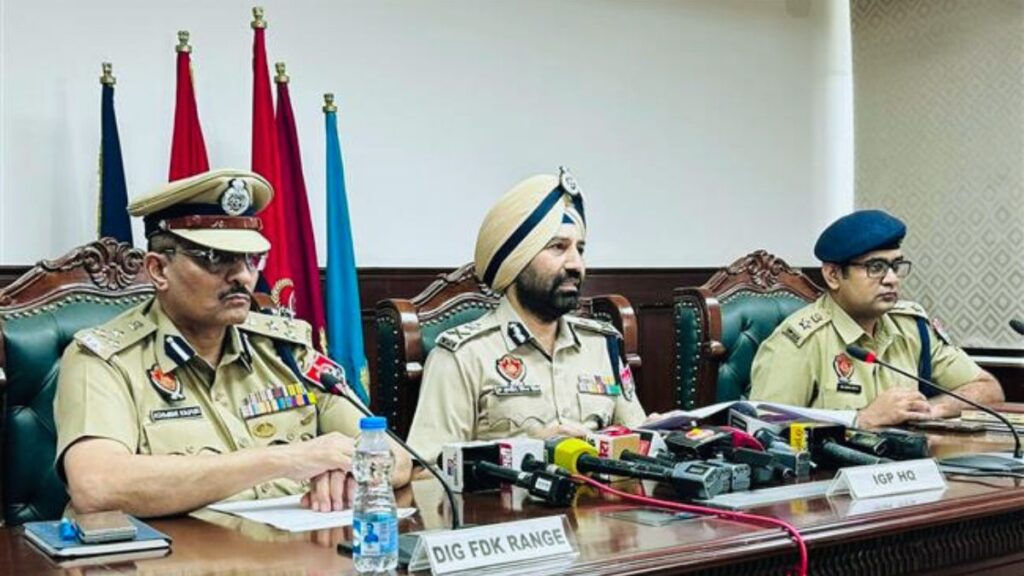Himachal Police 2 Punjab Professors Arrested on Corruption Charges
The vigilance department of Himachal Pradesh Police recently made a significant, detaining two pharmacy professors Arrested from Punjab. The professors, Rakesh Chawla and Puneet Bansal, were apprehended for accepting undue favors from a pharmaceutical institute based in Kangra. Both professors are affiliated with prominent institutions; Chawla with Baba Farid University and Bansal with the Central University in Bathinda.
This arrest followed an inspection they conducted at the Sai School of Pharmaceutical Education and Research, a constituent of Shri Sai University in Palampur. The professors were deputed by the Pharmacy Council of India (PCI) to evaluate the university’s application to commence a new pharmacy course. However, their integrity came under scrutiny when they were caught with a substantial amount of cash at a check post in Rakkad, Dehra.
The professors were intercepted and arrested on Sunday after vigilance officials, acting on a tip-off, discovered ₹3.5 lakh in their possession. The officials noted that Chawla, from Faridkot, and Bansal, from Barnala, were unable to provide a satisfactory explanation for the source of the money. This discovery led to their immediate arrest and the initiation of a corruption investigation.
A case has been registered against both professors under Section 13(2) of the Prevention of Corruption Act, 1998, as amended in 2018. The case is being handled by the state vigilance and anti-corruption bureau in Dharamshala. Balbir Thakur, SP of the vigilance and anti-corruption bureau, confirmed the arrests and mentioned that an investigation is underway to uncover more details regarding the incident.
The arrest of Chawla and Bansal has significant implications for academic integrity and the credibility of inspections conducted by the PCI. These inspections are crucial for maintaining the standards of pharmaceutical education in India. The alleged actions of these professors undermine the trust placed in such regulatory processes and highlight the need for stringent oversight and accountability in academic inspections.
Corruption in academic evaluations can have far-reaching consequences, including the approval of substandard educational programs, which ultimately affects the quality of education and the competence of graduates. The vigilance department’s proactive measures in this case serve as a reminder of the importance of integrity and transparency in educational institutions and regulatory bodies.
The Pharmacy Council of India plays a pivotal role in regulating pharmacy education and practice in India. By deputing experienced professors to conduct inspections, the PCI aims to ensure that educational institutions meet the required standards for commencing new courses. However, incidents like this raise questions about the selection and monitoring of inspectors.
To restore faith in the inspection process, the PCI may need to implement more rigorous checks and balances. This could include enhanced training for inspectors on ethical standards, regular audits of inspection processes, and stricter penalties for those found guilty of misconduct.
Preventing similar incidents in the future will require a multifaceted approach. Educational institutions must foster a culture of honesty and ethical behavior among their staff and students. Regulatory bodies like the PCI must enforce strict guidelines and oversight to deter potential corruption.
Additionally, the implementation of technology in inspection processes could enhance transparency. Digital record-keeping, real-time reporting, and automated systems for inspection evaluations can reduce the chances of human error and misconduct. Public awareness campaigns about the importance of integrity in education can also contribute to a more vigilant and informed community that actively opposes corruption.
The ongoing investigation into the actions of Rakesh Chawla and Puneet Bansal will likely reveal more about the extent of their alleged misconduct. As the case unfolds, it serves as a crucial reminder of the need for unwavering integrity in all aspects of education and regulation. Upholding ethical standards is not just about compliance with laws but also about maintaining the trust and respect of the academic and professional community.
The vigilance department’s efforts in this case are commendable and necessary for preserving the sanctity of educational inspections. By addressing such issues head-on, authorities can work towards a more transparent, accountable, and trustworthy system that benefits all stakeholders in the educational landscape.
What led to the arrest of professors in Himachal Pradesh?
The professors were arrested after they were found with ₹3.5 lakh in cash, which they could not explain, following an inspection at a pharmaceutical institute.
Who are the professors involved in this case?
Rakesh Chawla from Baba Farid University and Puneet Bansal from the Central University of Bathinda were the professors arrested.
What institution did the professors inspect before their arrest?
They conducted an inspection at the Sai School of Pharmaceutical Education and Research, a constituent of Shri Sai University, Palampur.
Under which law were the professors charged?
They were charged under Section 13(2) of the Prevention of Corruption Act, 1998, as amended in 2018.
What is the role of the Pharmacy Council of India in this case?
The Pharmacy Council of India had deputed the professors to inspect and evaluate the university’s application for a new pharmacy course.
What measures can be taken to prevent such incidents in the future?
Enhanced training for inspectors, stricter penalties for misconduct, technological integration in inspection processes, and fostering a culture of ethical behavior in educational institutions are some measures that can help prevent such incidents.
Stay connected with NH Punjab on social media. Follow us on Facebook, Twitter/X, and Instagram for the latest news updates, behind-the-scenes content, and more. Engage with us online and be a part of our growing community.
Sign up for our newsletter to get the latest news delivered straight to your inbox. Follow us on social media for real-time updates and engaging content.



